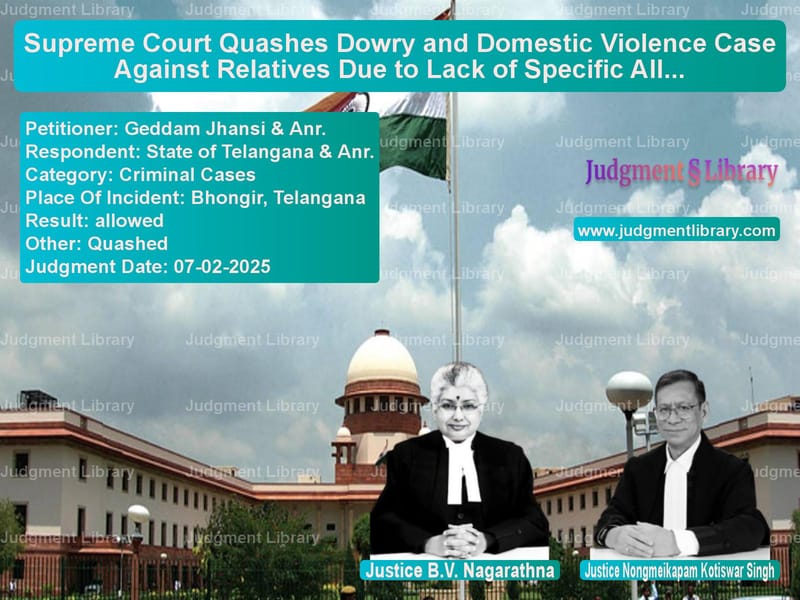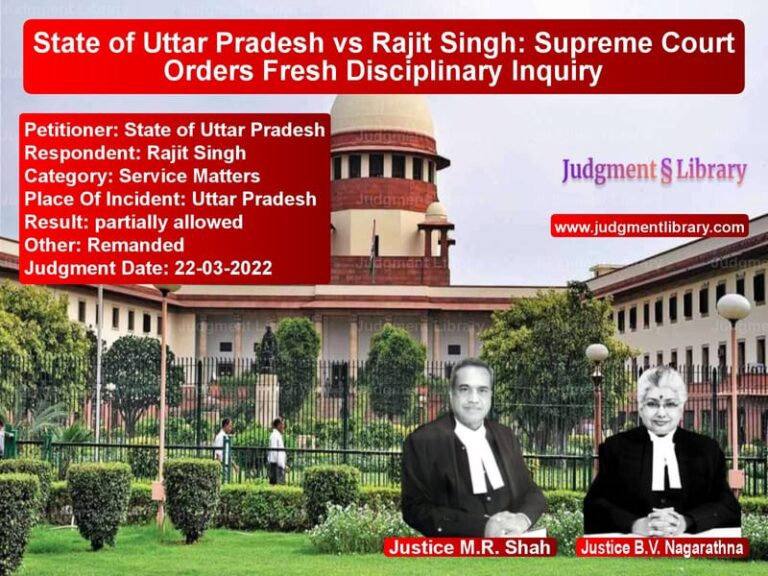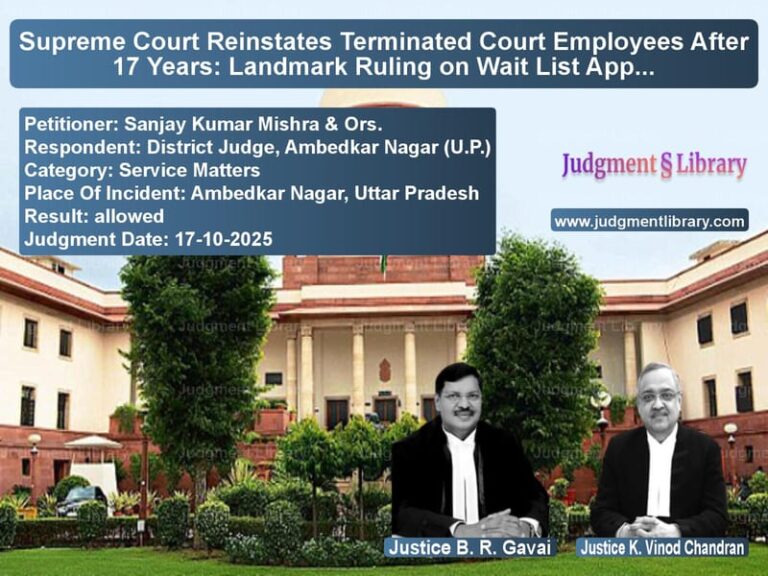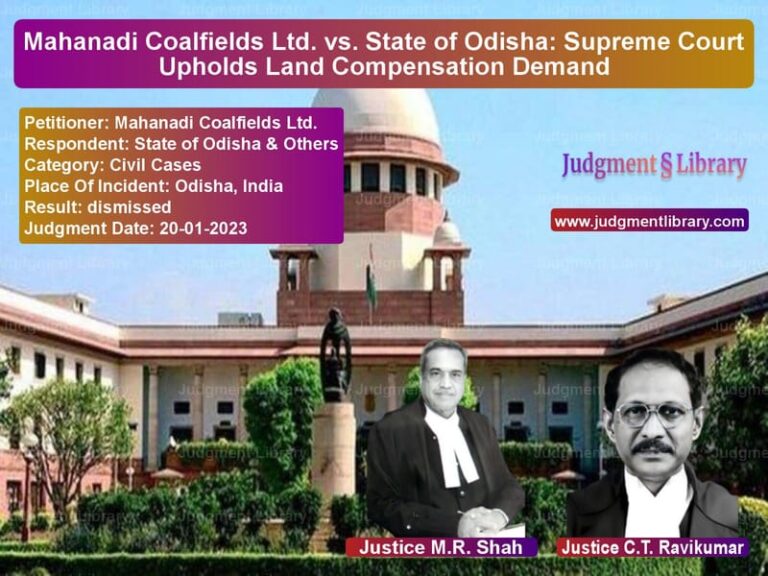Supreme Court Quashes Dowry and Domestic Violence Case Against Relatives Due to Lack of Specific Allegations
In a landmark judgment, the Supreme Court of India quashed criminal proceedings against two relatives accused under Sections 498A and 506 of the Indian Penal Code (IPC), along with provisions of the Dowry Prohibition Act, 1961, and the Protection of Women from Domestic Violence Act, 2005. The Court held that the allegations against the appellants were vague and general, lacking specific instances of wrongdoing, and that criminal law should not be misused in domestic disputes.
Background of the Case
The case originated from a complaint filed by Premlata, the wife of Dr. Samuel Suresh, who alleged that she was subjected to dowry demands and harassment by her husband and his relatives. The allegations led to the registration of an FIR at Bhongir Women Police Station in Telangana under Sections 498A and 506 IPC and Sections 3 and 4 of the Dowry Prohibition Act.
Additionally, a separate complaint was filed under the Domestic Violence Act, citing physical and mental harassment. The accused, including the appellant-relatives, challenged these proceedings in the Telangana High Court, which refused to quash the charges. They then approached the Supreme Court.
Key Legal Issues
- Whether vague and general allegations without specific instances can form the basis of a criminal prosecution under dowry and domestic violence laws.
- Whether the appellants, who were not residing with the complainant, could be implicated in alleged acts of harassment.
- Whether quashing of proceedings was justified under Section 482 of the Criminal Procedure Code (CrPC).
Arguments by the Appellants
The appellants, Geddam Jhansi and Geddam Sathyakama Jabali, argued:
- The allegations against them were vague and general, lacking specific acts attributed to them.
- They did not reside in the matrimonial home of the complainant, making the accusations of harassment untenable.
- The complaint was motivated by personal animosity and aimed at pressuring the family.
- The High Court failed to appreciate that general allegations cannot be the basis for criminal prosecution.
“The allegations are devoid of specific overt acts and, therefore, incapable of establishing criminal liability.”
Arguments by the Respondents
The complainant and the State of Telangana contended:
- The appellants actively participated in pressuring the complainant to fulfill dowry demands.
- Domestic violence laws require a broad interpretation to protect victims from all forms of harassment.
- The allegations were sufficient for trial, and the matter should be decided based on evidence.
“The complainant has clearly stated that the accused participated in the acts of harassment. Their role should be determined through trial.”
Supreme Court’s Observations
The Supreme Court scrutinized the allegations and found:
- The complaint primarily revolved around the actions of the husband and mother-in-law, with the appellants being included without specific instances of wrongdoing.
- The charge sheet contained identical statements from witnesses, which did not establish a clear case against the appellants.
- The appellants’ residence in Hyderabad, away from the complainant’s matrimonial home, weakened the allegations against them.
- General accusations that the appellants “pressured” the complainant to obey her husband were insufficient to attract criminal liability.
“Criminal law is not to be used as a tool for settling personal scores or matrimonial disputes unless there is clear evidence of involvement.”
Final Judgment
The Supreme Court ruled:
“The impugned judgments of the High Court refusing to quash proceedings are set aside. The criminal proceedings in C.C. No. 46 of 2022 and DVC No. 25 of 2021 against the appellants are quashed.”
The Court emphasized that allegations in domestic disputes must be specific and supported by credible material before initiating criminal proceedings.
Impact of the Judgment
This ruling has significant implications:
- Prevents misuse of criminal law in matrimonial disputes.
- Reinforces the need for specific allegations against each accused in dowry and domestic violence cases.
- Clarifies that mere familial association does not warrant criminal prosecution.
- Encourages courts to scrutinize complaints to prevent harassment through legal mechanisms.
By quashing the proceedings, the Supreme Court has reinforced that while genuine cases of dowry harassment must be dealt with stringently, false or vague allegations should not be used to abuse legal provisions.
Petitioner Name: Geddam Jhansi & Anr..Respondent Name: State of Telangana & Anr..Judgment By: Justice B.V. Nagarathna, Justice Nongmeikapam Kotiswar Singh.Place Of Incident: Bhongir, Telangana.Judgment Date: 07-02-2025.
Don’t miss out on the full details! Download the complete judgment in PDF format below and gain valuable insights instantly!
Download Judgment: geddam-jhansi-&-anr.-vs-state-of-telangana-&-supreme-court-of-india-judgment-dated-07-02-2025.pdf
Directly Download Judgment: Directly download this Judgment
See all petitions in Domestic Violence
See all petitions in Dowry Cases
See all petitions in Bail and Anticipatory Bail
See all petitions in Judgment by B.V. Nagarathna
See all petitions in Judgment by N. Kotiswar Singh
See all petitions in allowed
See all petitions in Quashed
See all petitions in supreme court of India judgments February 2025
See all petitions in 2025 judgments
See all posts in Criminal Cases Category
See all allowed petitions in Criminal Cases Category
See all Dismissed petitions in Criminal Cases Category
See all partially allowed petitions in Criminal Cases Category







